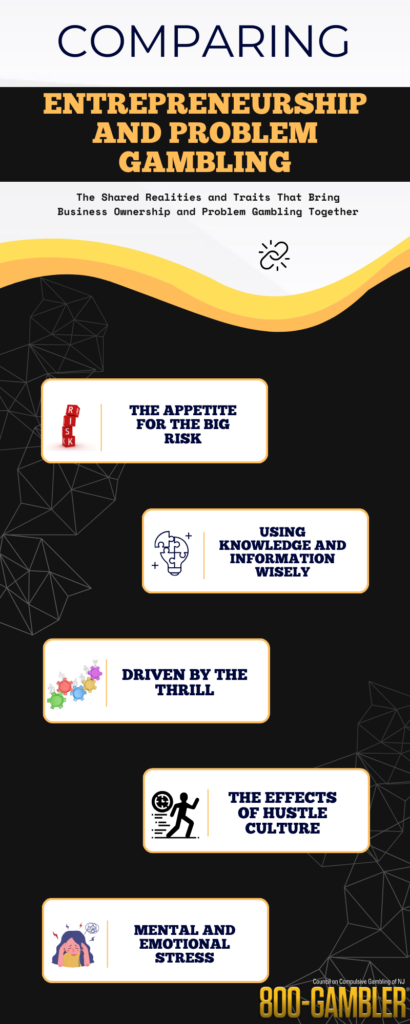Could the entrepreneurial spirit, with its inherent risk-taking and pursuit of success, share commonalities with problem gambling? Both domains involve a degree of uncertainty and an appetite for risk. However, where does one draw the line between entrepreneurial courage and problem gambling? And can those traits that push you to grow your business also push you to problem gambling?

The Willingness to Take Big Risks
Entrepreneurs are often lauded for their audacity to take risks. They bravely venture into unknown territories, fueled by innovative ideas and the unyielding drive to transform them into tangible realities. This propensity for risk-taking can sometimes mimic the behavior of problem gamblers, who also embrace risk, wagering on uncertain outcomes in the hope of securing significant wins. Recognizing the boundary between healthy entrepreneurial risk-taking and problem gambling is critical to making sure that the pursuit of success doesn’t devolve into harmful choices.
The key distinction lies in the type of risks taken. Entrepreneurs typically engage in calculated risks, considering potential losses and gains, while problem gamblers may take risks indiscriminately, often leading to financial and personal consequences.
Knowledge Is Key — But It’s Not Everything
In both entrepreneurship and gambling, knowledge plays a pivotal role. For entrepreneurs, understanding their market, competition, and customer needs is essential in making informed, strategic decisions. Similarly, gamblers require knowledge of the odds, risks, and likelihood of specific outcomes, which play a massive role in the next move. But when misused or lacking sufficient knowledge, some problem gamblers convince themselves they can predict or control the game’s outcome based on that faulty information.
Unlike entrepreneurs who base decisions on researched facts and figures, the information at your disposal about gambling is minimal. And even then, some business owners may have plenty of information but still choose to or be forced to engage in risky behavior. Most entrepreneurs agree that gambling is a high-risk and low-reward situation that relies far too much on force that they can’t influence. But this mindset requires knowing that you don’t have enough information and being honest and true to yourself about the risks of your next move. Knowledge can be powerful for both parties but can only go so far if you can’t utilize it to your benefit.
Seeking the Thrill
There’s a common saying that entrepreneurs are willing to work 80 hours a week to avoid working 40 hours a week. As funny (and sometimes true) as it is, the thing that drives entrepreneurs is the thrill of starting a new business and taking on challenges that can lead to positive outcomes. There’s a certain thrill that comes with launching a start-up and watching it flourish — much like the rush a gambler experiences when they secure a win. This thrill-seeking behavior is a common thread that weaves through both entrepreneurship and problem gambling.
Can Entrepreneurs Feel the Same Effects in Their Field as Problem Gamblers?
The relentless pressure to succeed, coupled with long hours and financial instability, can severely impact your mental and emotional well-being. When your mind isn’t right, it can cause you to make irrational decisions that aren’t backed by the research or strategies you’re used to. And if you get too caught up in the thrill of the next “winning” decision, you can find yourself in deeper problems than you first started.
Doesn’t that sound a lot like problem gambling AND entrepreneurship?
Problem gamblers often grapple with financial stress, strained relationships, and mental health issues, and entrepreneurs can face strikingly similar challenges. These challenges can lead to the same outcomes if you aren’t aware of them. It’s important to be cognizant of these parallels and ensure that the entrepreneurial journey doesn’t lead to a state mirroring problem gambling or even lead you toward problem gambling as a form of solace. Regular self-checks, maintaining a strong support system, and seeking professional help when needed can go a long way in preserving one’s health and happiness.
“Hustle Culture” and Problem Gambling
In today’s fast-paced world, “hustle culture” is often glorified. This culture promotes working relentlessly towards your goals, much like an entrepreneur tirelessly striving for their venture’s success. However, this mindset can also mirror problem gambling, where individuals might continue to bet in an attempt to recover their losses or achieve a win.
Recognizing when hard work becomes harmful is essential to prevent the onset of problem gambling behaviors. Don’t treat your business like you’re at a roulette table. Entrepreneurs indeed have to work hard, but working hard without a plan is just working to waste time. And that can lead to frightening outcomes. Don’t forget to strategize, but also put your mental and emotional health first. The last thing you want is to start relying on poor habits to take the stress away.
Set Your Key Strategies for Addressing Problem Gambling With 800-GAMBLER
While there are overlaps between problem gambling and entrepreneurship, it’s important to distinguish between the two. If you or someone you know is struggling with problem gambling, reaching out to 800-GAMBLER can be a helpful first step. We offer a variety of help for gamblers, including research, self-assessment tools, counseling services, support for friends and family, and more, to help individuals navigate their struggles with problem gambling. Prioritize your well-being and grow your business without dealing with the negatives of being an entrepreneur.



